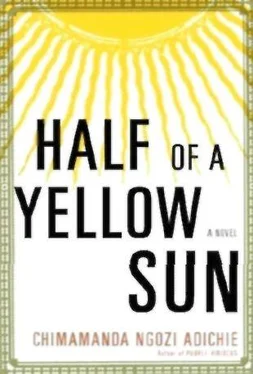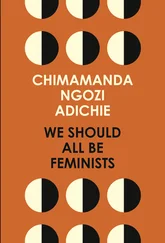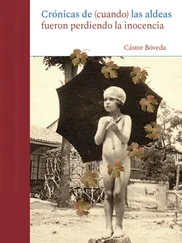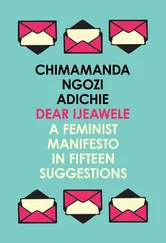Baby began to cry when they got to the bathroom. The piles of feces in the bathtub were dried, obscene stonelike lumps. Pages had been ripped out of Drum magazine and used as toilet paper, crusty stains smearing the print. They lay strewn on the floor. Olanna hushed her and Ugwu thought of her playing with her yellow plastic duck in that tub. He turned the tap, and it squeaked but did not run. The grass in the backyard grazed his shoulders, too tall to walk across, so he found a stick to beat his way through. The beehive on the cashew tree was gone. The door to the Boys' Quarters hung half open on crushed hinges and he pushed it back and remembered the shirt he had left hanging on a nail on the wall. He knew it would be gone, of course, and yet he looked at the wall for it. Anulika had admired that shirt. It thrilled and frightened him, the thought that he would see Anulika in a few hours, that he would finally go home. He would not allow himself to think of who was left and who was not. He picked up the things on the filthy floor, a rusting gun and a bloated half-eaten copy of the Socialist Review. He threw them back down and, in the reverberating echo, something, perhaps a mouse, dashed across.
He wanted to clean. He wanted to scrub furiously. He feared, though, that it would change nothing. Perhaps the house was stained to its very foundation and that smell of something long dead and dried would always cling to the rooms and the rustle of rats would always come from the ceiling. Master found a broom and swept the study himself and left the pile of lizard droppings and dust just outside the door. Ugwu looked inside the study and saw him sitting on the only chair left, with a broken-off leg, so that he propped it against the wall for balance, hunched over half-burned papers and files.
Ugwu poked at the feces in the bathroom with a stick, muttering curses to the vandals and all their offspring, and he had cleared the tub when Olanna asked him to leave the cleaning until he came back from seeing his family.
Ugwu stood still as Chioke, his father's second wife, threw sand at him. "Are you real, Ugwu?" she asked. "Are you real?"
She bent and grabbed handfuls of sand, throwing in rapid movements, and the sand fell on his shoulder, arms, belly. Finally, she stopped and hugged him. He had not disappeared; he was not a ghost. Other people came out to hug him, to rub his body in disbelief as though the sand-pouring had still not proved to them that he was not a ghost. Some of the women were crying. Ugwu examined the faces around him, all of them thinner, all with a deep exhaustion etched on their skin, even the children. But it was Anulika who looked most changed. Her face was covered in blackheads and pimples and she did not look him in the eyes as she said, in tears, "You did not die, you did not die." He was startled to discover that the sister he had remembered as beautiful was not at all. She was an ugly stranger who squinted with one eye.
"They told me my son had died," his father said, gripping his shoulders.
"Where is Mama?" he asked.
Before his father spoke, Ugwu knew. He had known from the moment Chioke ran out. It should have been his mother; she would have sensed his presence and met him at the grove of ube trees.
"Your mother is no longer with us," his father said.
Hot tears swarmed Ugwu's eyes. "God will never forgive them."
"Be careful what you say!" His father looked around fearfully, although he and Ugwu were alone. "It was not the vandals. She died of the coughing. Let me show you where she is lying."
The grave was unmarked. A vibrantly green cocoyam plant was growing on the spot.
"When?" Ugwu asked. "When did she die?"
It felt surreal, asking When did she die ?about his own mother. And it did not matter when she died. As his father spoke words that made no sense, Ugwu sank to his knees, placed his forehead on the ground, and wrapped his hands around his head, as if to shield himself from something that would fall from above, as if it were the only position he could adopt to absorb his mother's death. His father left him and walked back into the hut. Later, Ugwu sat with Anulika under the breadfruit tree.
"How did Mama die?"
"From coughing."
She didn't answer any of his other questions in the way that he had expected, there were no energetic gestures, no sharp wit in her answers: yes, they had the wine-carrying just before the vandals occupied the village. Onyeka was well; he had gone to the farm. They did not have children yet. She looked away often, as if she felt uncomfortable sitting with him, and Ugwu wondered if he had imagined the easy bond they had shared. She looked relieved when Chioke called her, and she got up quickly and left.
Ugwu was watching the children running around the breadfruit tree, taunting and shouting, when Nnesinachi arrived with a baby on her hip and a sparkle in her eyes. She looked unchanged; unlike the others, she was not thinner than he remembered. Her breasts were a little larger, though, prodding the fabric of her blouse. She pressed herself against him in a hug. The baby yelped.
"I knew you did not die," she said. "I knew your chi was wide awake."
Ugwu touched the baby's cheek. "You married during the war?"
"I did not marrry." She moved the baby to the other hip. "I lived with a Hausa soldier."
" A vandal?" It was almost inconceivable to him.
Nnesinachi nodded. "They were living in our town and he was good to me, a very kind man. If I had been here at the time, what happened to Anulika would not have happened at all. But I had traveled to Enugu with him to buy some things."
"What happened to Anulika?"
"You didn't know?"
"What?"
"They forced themselves on her. Five of them." Nnesinachi sat down and placed the baby on her lap.
Ugwu stared at the distant sky. "Where did it happen?"
"It has been more than a year."
"I asked where?"
"Oh." Nnesinachi's voice quavered. "Near the stream."
"Outside?"
"Yes."
Ugwu bent down and picked up a stone.
"They said the first one that climbed on top of her, she bit him on the arm and drew blood. They nearly beat her to death. One of her eyes has refused to open well since."
Later, Ugwu took a walk around the village, and when he got to the stream he remembered the line of women going to fetch water in the mornings, and he sat down on a rock and sobbed.
Back in Nsukka, Ugwu did not tell Olanna about his sister's rape. She was often away. She was receiving message after message about where women who looked like Kainene had been seen, and so she went to Enugu, Onitsha, and Benin and came back humming under her breath. "I will find my sister," she would say when Ugwu asked her how it had gone.
"Yes, mah, you will," Ugwu said, because he had to believe, for her sake, that she would.
He cleaned the house. He went to the market. He went to Freedom Square to see the mound of blackened books that the vandals had emptied out of the library and set afire. He played with Baby. He sat outside on the steps that led to the backyard and wrote on scraps of paper. Chickens were squawking in the yard next door. He looked at the hedge and wondered about Chinyere, what she had thought of him, if she had survived. Dr. Okeke and his family had not returned, and now a bowlegged man, a professor of chemistry who cooked on firewood and had a chicken coop, lived there. One day, in the failing light of dusk, Ugwu looked up and saw three soldiers barge into the compound and leave moments later, dragging the professor.
Ugwu had heard that the Nigerian soldiers had promised to kill five percent of Nsukka academics, and nobody had heard of Professor Ezeka since he was arrested in Enugu, but it was suddenly real to him, seeing the professor next door dragged off. So, days later, when he heard the loud banging on the front door, he thought they had come for Master. He would tell them Master was not home; he would even tell them Master had died. He dashed first to the study, whispered, "Hide under the table, sah!" and then ran to the front door and wore a dumb look on his face. Instead of the menacing green of army uniforms, the shine of boot and gun, he saw a brown caftan and flat slippers and a familiar face that took him a moment to recognize: Miss Adebayo.
Читать дальше












